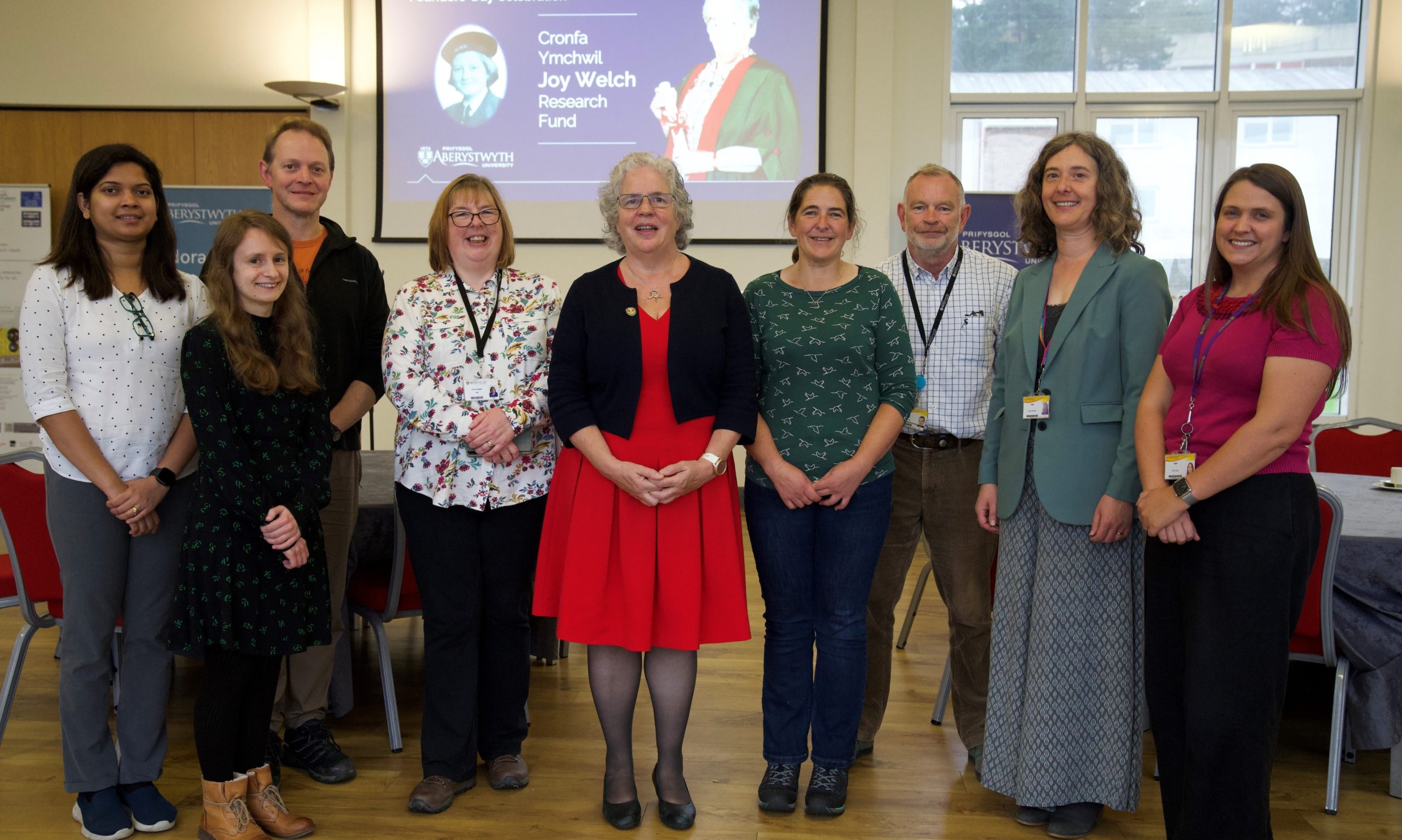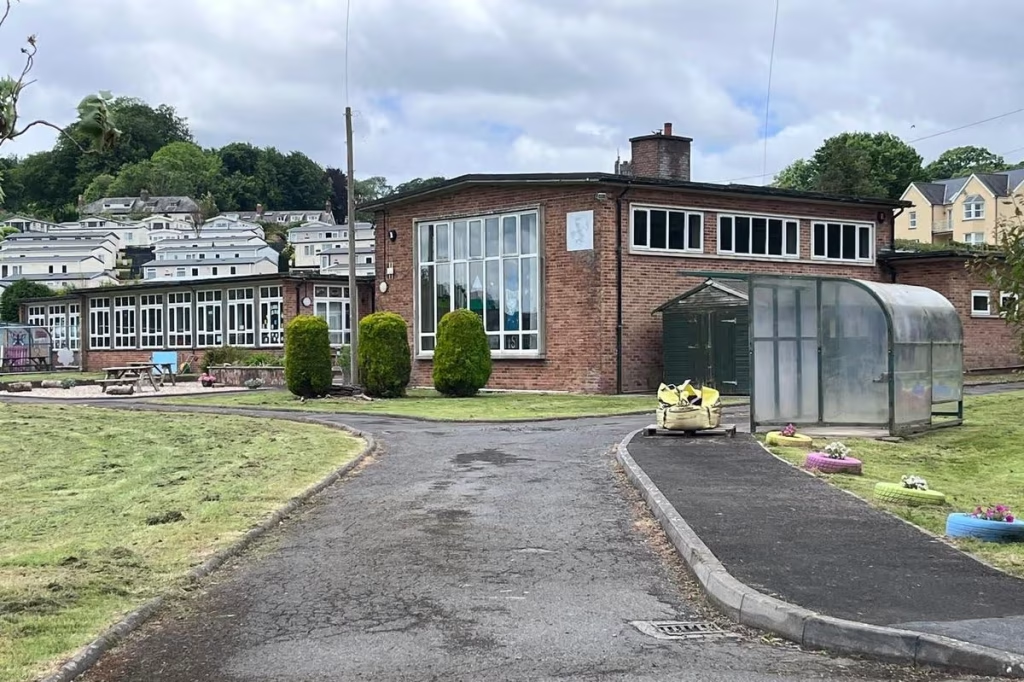Education
£3 million from Enigma codebreaker for Aberystwyth University research

AN ABERYSTWYTH graduate who contributed to the breaking of the German Enigma code during the Second World War has left over £3m to her former University.
Originally from Galgate near Lancaster, Joy Welch studied Economics, Geography and Philosophy at Aberystwyth and graduated in 1950.
In 1943, aged 17, Joy volunteered for the Women’s Royal Naval Service and the work took her to Eastcote, an outpost of Bletchley Park.
There she operated the machines used to break the German Enigma code.
In 1988 she established the Joy Welch Educational Charitable Trust and the University became a regular beneficiary, reflecting her fond memories of her time at Aberystwyth.
Her long-term support was recognised in 1998 when she was awarded an Honorary Fellowship by the University. She died in 2017.
The new endowment totalling £3.15m from the Joy Welch Educational Charitable Trust was announced today, Friday 13 October, by Vice-Chancellor Professor Elizabeth Treasure at the University’s annual Founders Day celebrations.
With the first call for applications due in spring 2024, the fund will provide a minimum of 12 research grants a year for postgraduates and postdoctoral researchers across all disciplines at Aberystwyth University.
Professor Elizabeth Treasure said; “We are absolutely delighted that the ongoing relationship with one of our alumni has supported researchers across disciplines and ranks for so many years. The endowment will make sure that this support continues. In a world where research funding programmes change, favouring certain academic fields and types of projects at different times, the Joy Welch Fund will offer opportunities to all our researchers and so make a valuable difference”.
In addition to supporting postgraduate and postdoctoral research, the Trust has also contributed £170,000 towards establishing the Joy Welch Seminar Room in the Old College.
Research funded by the Joy Welch Educational Charitable Trust
Over the years, the Trust has provided over £400,000 to fund research at Aberystwyth University.
Dr Otar Akanyeti from the Department of Computer Science, Dr Sarah Dalesman and Dr Sebastian McBride from the Department of Life Sciences, and Dr Alice Vernon from the Department of English and Creative Writing are amongst those who have received support in recent years.
Dr Otar Akanyeti’s work focuses on care for stroke sufferers. Support from the Joy Welch Trust has enabled Dr Akanyeti and his team to secure more than half a million pounds of external funding and are currently running two clinical studies in Aberystwyth and Turkey.
Dr Akanyeti said; “The support from the Joy Welch Trust over the years has enabled us to establish a new research group focusing on improving stroke care pathways using technology and artificial intelligence. We were able to prototype a new gait monitoring technology, engage with stroke patients and their families, disseminate our work in Welsh Stroke Conference and establish new collaborations across the UK and internationally.”
Dr Sarah Dalesman and Dr Sebastian McBride from the Department of Life Sciences have been studying the cognitive abilities of dogs and how they can impact the safety and welfare of dog training.
Dr Dalesman said; “The Joy Welch funding this year has enabled us to buy equipment and employ a student who now plans to pursue a masters’ in this field. It has also led to future research plans to study how, using non-invasive techniques, stress affects dogs’ cognitive ability and performance.”
Dr Alice Vernon from the Department of English and Creative Writing received a Joy Welch grant in 2021-22 for her project ‘Inner Workings: How We Understand and Imagine the Inside of the Human Body’.
Dr Vernon said; “The support of the Joy Welch fund allowed me to conduct archive research in London for the first time, which really helped develop my skills as a researcher and writer. As a result of this work, I was selected to give a lecture at Hay Festival in 2022 which has been one of the high points of my career so far. This was my first grant success and was influential in encouraging me to submit further funding applications. As such, in 2023 I was awarded a University Research Fund award, and I will now be applying for external funding with the Leverhulme Trust and British Academy.”
Pictured: Vice-Chancellor Professor Elizabeth Treasure (centre) and Dr Eva De Visscher, Trusts and Foundations Manager at Aberystwyth University (second from right) mark the new Joy Welch endowment with researchers who have received support from the Trust (left to right) Dr Valerie Rodrigues (Life Sciences), Dr Alice Vernon (English and Creative Writing), Professor Stephen Tooth (Geography and Earth Sciences), Tracy Knight, Dr Sarah Dalesman and Dr Rhys Thatcher (Life Sciences), and Dr Rachel Cross (Physics).
Education
Pembrokeshire youth workers lead life-changing wellbeing visit to Iceland

A GROUP of Pembrokeshire school-based youth workers recently took young people from four secondary schools on an unforgettable six-day visit to Iceland — a journey focused not only on education, but also on wellbeing, confidence and personal growth.
Funded through Taith, an international learning exchange programme for people in Wales, the trip brought together young people from across the county, many of whom had never travelled abroad before.
From the moment they arrived, the experience was designed to encourage participants to step outside their comfort zones, build resilience and develop friendships in a supportive environment.
One of the most powerful moments came as the group stood together at the Old Harbour in Reykjavik under the night sky, watching the Northern Lights shimmer above them. For many, it provided a rare pause from everyday pressures — a moment of calm, connection and awe that youth workers say will remain with them for years to come.
The group also attended Iceland’s Festival of Lights, experiencing the atmosphere of creativity, music and community spirit. Sharing the celebration helped young people appreciate the importance of culture, belonging and collective joy in supporting mental wellbeing.
A visit to the Secret Lagoon offered further opportunities to slow down. Immersed in warm geothermal waters surrounded by dramatic scenery, participants experienced the benefits of relaxation and mindfulness. Youth workers noted that these quieter moments allowed conversations to develop naturally, strengthening trust and deepening relationships.
The trip placed strong emphasis on teamwork and independence. Young people navigated travel arrangements, managed responsibilities, supported one another and adapted to unfamiliar surroundings — experiences which helped build confidence and social skills.
Meeting Icelandic peers at a local youth club was another highlight. Conversations about daily life, hopes and ambitions reinforced the idea that young people across the world share similar challenges and aspirations. These exchanges fostered empathy, broadened horizons and encouraged a stronger sense of global citizenship.
Senior Youth Worker Tristy McDermott said the impact of the visit was clear.
“We observed noticeable growth in many participants over the six days — quieter young people finding their voice, friendships forming across schools, and individuals showing resilience in new situations,” she said.
“Time away from routine, combined with positive adult support and inspiring surroundings, created space for reflection and self-discovery.
“For the young people of Pembrokeshire, this was far more than a visit abroad. It was an opportunity to build confidence, strengthen wellbeing, form lasting memories and return home with a renewed sense of possibility.”
The group extended thanks to Taith for making the experience possible.
Community
Letterston nursery equipment could be stored in cemetery

A CALL for a storage container for a “well-established and valued” Pembrokeshire children’s nursery in a nearby cemetery has been submitted to county planners.
In an application to Pembrokeshire County Council, Diane Evans of Meithrinfa Do Re Mi Nursery seeks permission for the installation of a storage container, partially in retrospect, at Horeb Cemetery, Station Road, Letterston.
A supporting statement says: “The container is required to provide essential ancillary storage to support the lawful and established nursery use within the [nearby] chapel building.
“The site forms part of an active cemetery, owned and managed by a group of trustees. The applicant is one of the trustees and has obtained formal permission from the trustees for the container to be sited on this land. The area selected previously comprised a large, longstanding mound of garden waste which has now been removed. The land has been levelled and prepared with a hard-standing base.
“The container will be used solely for storage of nursery equipment and materials, including outdoor learning resources, maintenance equipment, and items required to manage both the nursery grounds and the cemetery land. No additional operational activity will take place within or around the container.”
It adds: “The day nursery provides childcare for approximately 83 children from the local community and employs 21 staff, all of whom live locally. The nursery is a well-established and valued community facility, supporting local families and contributing positively to the local economy. Adequate storage is essential to ensure the safe, efficient and compliant operation of the nursery. The chapel building itself has limited internal storage, making external ancillary storage necessary.”
It says the nursery “operates with a strong community focus and promotes sustainability and environmental awareness,” with plans to soften its appearance through the planting of trees, shrubs and flowers.
It added: “Children will take part in a ‘sow, grow and give’ project, growing cut flowers from seed. These flowers will be made available to the community, particularly visitors to the cemetery, who will be invited to cut flowers to place on the graves of loved ones. This initiative enhances biodiversity, strengthens community links, and adds social value to the cemetery space.”
The application will be considered by county planners at a later date.
Education
Parents urge council not to close Ysgol Llansteffan

Campaigners call for delay amid Welsh language investigation and rising pupil numbers
PARENTS and campaigners have urged Carmarthenshire County Council’s Cabinet not to recommend the closure of Ysgol Llansteffan when members meet on Monday (Feb 23).
The appeal comes ahead of a proposed decision that could see the village’s Welsh-medium primary school close in August this year.
The Ysgol Llansteffan Parents and Teachers Association (PTA), supported by Cymdeithas yr Iaith, has written to councillors calling for the process to be halted, arguing that key evidence remains incomplete and that the case for closure is flawed.

Among their concerns is an ongoing investigation by the Welsh Language Commissioner into the language impact assessment used to support the closure proposal. Campaigners say it would be inappropriate for the council to make a final decision before the investigation is concluded.
They also claim no council decision-makers have visited the school to verify the information used in the proposal, despite significant changes in circumstances, including a rise in pupil numbers to 17 as of January 2026.
The PTA argues that this increase undermines earlier projections and raises questions about the reliability of longer-term forecasts used to justify closure.
Financial concerns have also been raised. While council documents suggest annual savings of around £112,000, campaigners say transport costs of approximately £50,000 per year and inflationary pressures have not been clearly accounted for, potentially overstating the net benefit.
Parents say closure would remove parental choice and risk damaging Welsh-medium education in the area by forcing some children to travel further or potentially move into English-medium provision.
Cymdeithas yr Iaith has backed the PTA’s call, warning that the council’s objection report failed to properly address concerns that insufficient school capacity elsewhere could push pupils out of Welsh-medium education altogether.
Campaigners have also criticised what they describe as factual inconsistencies in the council’s reports, including outdated enrolment figures and conflicting capacity estimates for neighbouring schools.
The PTA has asked the council to defer any decision until updated data is available, the Commissioner’s findings are published, and alternative options for sustaining the school have been fully explored.
In their letter, parents stressed they remain willing to work constructively with the council to develop a long-term solution that would allow the school to remain open as a sustainable Welsh-medium provision for the community.
Carmarthenshire County Council has previously said the proposal is intended to address falling pupil numbers, high surplus places and financial pressures at the school. Cabinet members were told earlier in the process that neighbouring Ysgol Llangain would have sufficient capacity to accommodate pupils if the closure proceeds, and that transferring learners would provide access to improved facilities and help ensure long-term sustainability of education provision in the area.
The final decision is expected to be taken by full council in March following the Cabinet’s recommendation.
-

 Health5 days ago
Health5 days agoWithybush loses emergency surgery in shock health board decision
-

 Health5 days ago
Health5 days agoHealth board confirms major hospital changes across west Wales
-

 Health4 days ago
Health4 days agoConcerns grow over Bronglais stroke plans as politicians demand clarity
-

 Health5 days ago
Health5 days agoHealth board: Changes will bring “resilience and sustainability” to West Wales services
-

 Local Government2 days ago
Local Government2 days agoCandidate who withdrew from Hakin race will still appear on ballot paper
-

 Crime7 days ago
Crime7 days agoTeen given community order after assaulting police officer at hospital
-

 Local Government7 days ago
Local Government7 days agoIndependent group threatens to oppose council tax plans over education cuts
-

 Crime7 days ago
Crime7 days agoWoman, 79, made 141 unnecessary 999 calls putting lives at risk, court hears






























